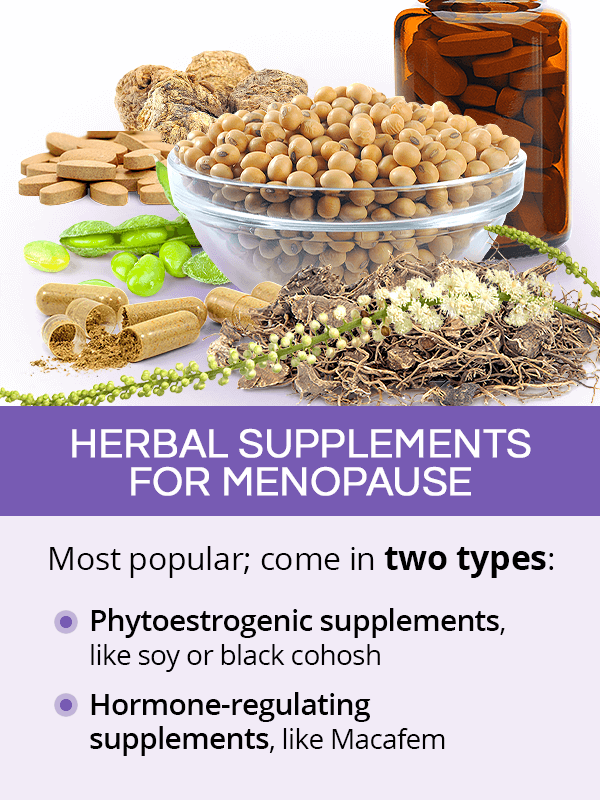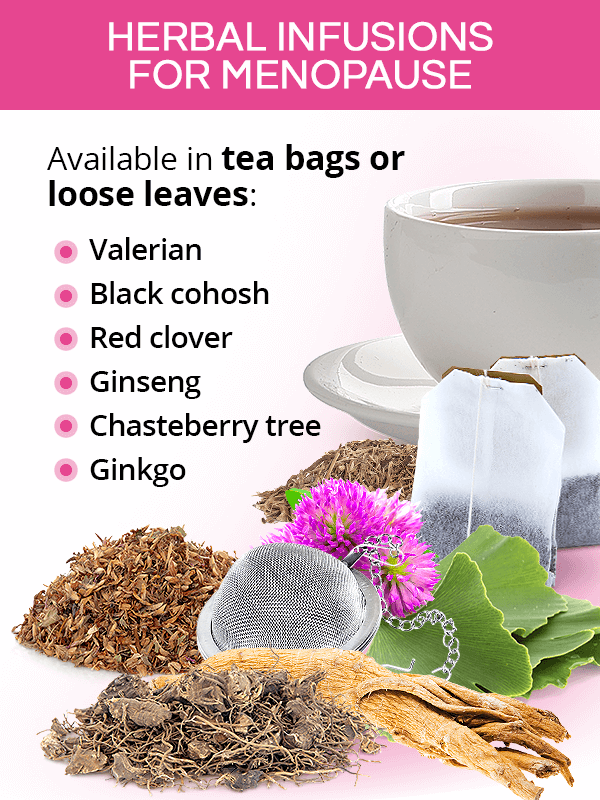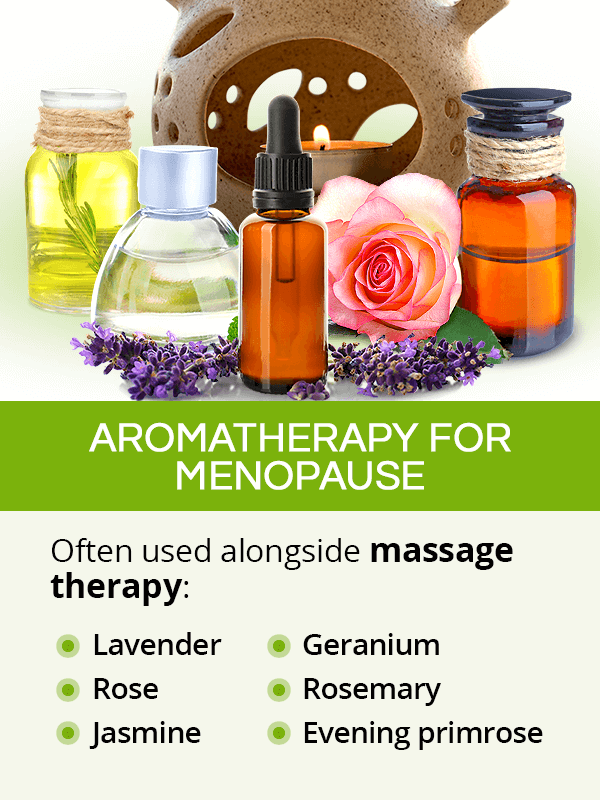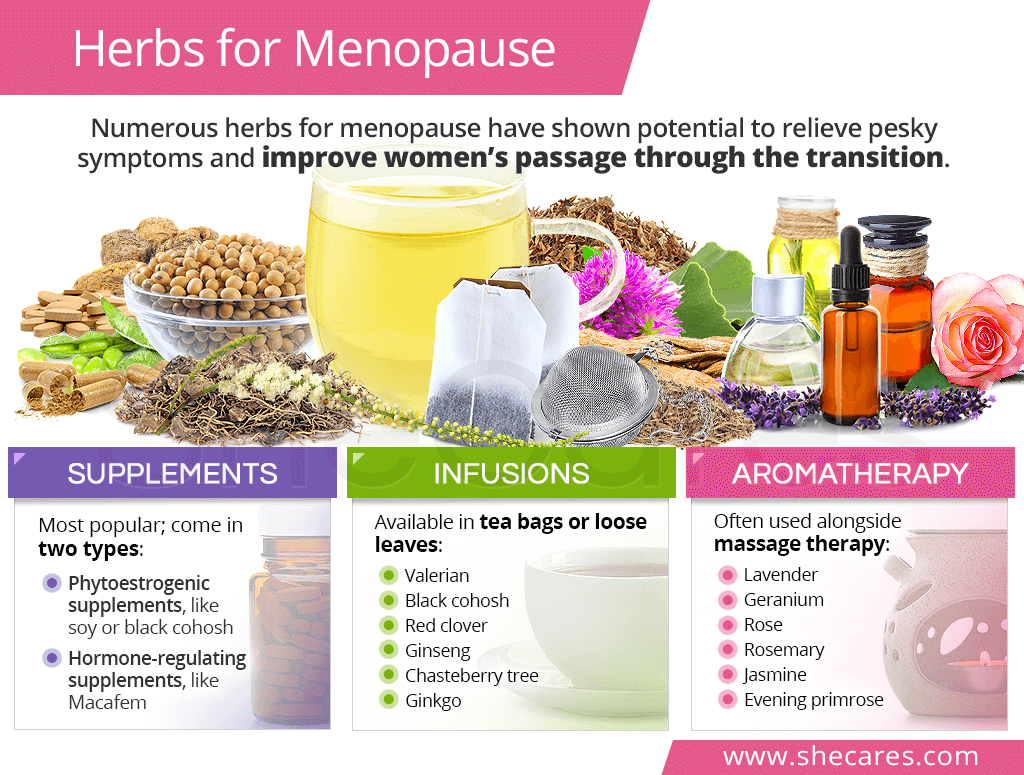Herbal Supplements

Of all herbal remedies for menopause, natural supplements are by far the most popular ones. They are not only easy to use, but they are also widely available through local herbalist stores or online sellers. They come in two types:
Phytoestrogenic Supplements
Phytoestrogenic herbs are some of the most abundant herbs for menopause. In fact, over 300 plants have been identified to date as containing phytoestrogens, including black cohosh, soy, red velvet, licorice, dong quai, and alfalfa.1
Phytoestrogens are compounds produced by plants that act similar to estrogen in the body. In women whose estrogen levels are rapidly changing, phytoestrogens bind to the body's estrogen receptors and mimic its functions. This helps ease the effects of hormone fluctuations, relieving symptoms of an imbalance and - possibly - helping prevent osteoporosis.2
It is important to keep in mind that long-term use of phytoestrogens is not recommended as it may make the body less capable of producing its own hormones, further worsening the hormonal imbalance.
Hormone-Regulating Supplements
Hormone-regulating supplements are another popular type of herbal supplements for menopause. They are very effective for reducing menopause symptoms, but their mechanism of action is different from that of phytoestrogenic ones.
Hormone-regulating supplements for menopause do not contain estrogen-like compounds. Instead, they act directly on the body's own endocrine glands, such as adrenal glands. By doing that, they stimulate them into producing hormones and easing menopause symptoms, including loss of libido, hot flashes, sleep problems, and mood swings.3
Since hormone-regulating supplements, like Macafem, do not introduce hormones into the body, they can be used long-term. As such, they can cover women's needs through postmenopause, thus lowering their risk of menopause problems.4
Herbal Infusions

Besides consuming them as supplements, various herbs for menopause can also be enjoyed in the form of infusions. They are available in tea bags or loose leaves, allowing women to adjust their concentration as needed.
Research has shown numerous benefits of sipping on herbal infusions for menopausal health. Some of them include:5,6,7,8,9
- Valerian's effects on alleviating insomnia, headaches, and menopause stress
- Black cohosh root's reductions in hot flashes and night sweats
- Red clover's abilities to strengthen bones, helping slow down osteoporosis
- Ginseng's benefits for low libido and sexual dysfunction
- Chasteberry tree's actions for alleviating hot flashes and breast pain
- Ginkgo biloba's potential in regulating mood swings
- Green tea's role in preventing osteoporosis and menopause heart disease
Aromatherapy

Another way to take advantage of the medicinal properties of herbs for menopause is aromatherapy. This ancient practice uses essential oils to stimulate the body's beneficial responses, both emotional and physiological.
While it can be done on its own, aromatherapy is oftentimes paired with massage therapy, which is another beneficial alternative therapy for menopause. What is more, these effects are usually seen in a matter of weeks.
Numerous scientific studies have shown significant reductions in menopause symptoms after aromatherapy sessions with and without massage, including hot flashes, depression, anxiety, low libido, sleep disorders, and pain. They also found substantial improvements in osteoporosis prevention as well as women's quality of life.10,11,12,13,14
Some of the most popular aromatherapy herbs include the following (keep in mind that are generally used in combination, rather than on their own):
- Lavender
- Geranium
- Rose
- Rosemary
- Jasmine
- Evening primrose
- Bitter orange flower (neroli oil)
- Basil
- Citrus
- Peppermint
Key Takeaways
It is key to remember that individual reactions to herbal remedies may vary greatly from woman to woman. As such, it is also a good idea to consult a doctor to ensure that they are the right fit and to establish the recommended dosage. Nevertheless, herbs for menopause have shown in scientific studies to have the potential to relieve pesky symptoms and improve women's passage through the transition. Due to their ease-of-use, herbal supplements – such as phytoestrogenic and hormone-regulating supplements – are the most popular herbal products women buy. But other herbal remedies for menopause are also worth considering, including natural infusions and aromatherapy.
Sources
- Bone. (2003). Common herbs, essential oils, and monoterpenes potently modulate bone metabolism. Retrieved April 22, 2021 from https://www.sciencedirect.com/science/article/abs/pii/S8756328203000279
- BMC Complementary and Complementary Alternative Medicine. (2010). Maca (L. meyenii) for improving sexual function: a systematic review. Retrieved April 22, 2021 from https://pubmed.ncbi.nlm.nih.gov/20691074/
- Climacetric. (2015). Efficacy of phytoestrogens for menopausal symptoms: a meta-analysis and systematic review. Retrieved April 22, 2021 from https://www.tandfonline.com/doi/full/10.3109/13697137.2014.966241
- International Journal of Molecular Science. (2017). Edible Plants and Their Influence on the Gut Microbiome and Acne. Retrieved April 22, 2021 from https://www.mdpi.com/1422-0067/18/5/1070/htm
- Journal of Evidence-Based Integrative Medicine. (2019). Complementary and Alternative Medicine for Menopause. Retrieved April 22, 2021 from https://journals.sagepub.com/doi/full/10.1177/2515690X19829380
- Journal of Chromatographic Science. (2012). Estrogenic Activities of Ten Medicinal Herbs from the Middle East. Retrieved April 22, 2021 from https://academic.oup.com/chromsci/article/51/1/33/288405
- Menopause. (2008). Beneficial effects of Lepidium meyenii (Maca) on psychological symptoms and measures of sexual dysfunction in postmenopausal women are not related to estrogen or androgen content. Retrieved April 22, 2021 from https://pubmed.ncbi.nlm.nih.gov/18784609/
- National Women's Health Network. (2015). Herbs and Phytoestrogens. Retrieved April 22, 2021 from https://nwhn.org/herbs-and-phytoestrogens/
- The North American Menopause Society. (n.d.). Natural Remedies for Hot Flashes. Retrieved April 22, 2021 from https://www.menopause.org/for-women/menopauseflashes/menopause-symptoms-and-treatments/natural-remedies-for-hot-flashes
Footnotes:
- Darbre, P. (2015). Endocrine Disruption and Human Health. Retrieved April 22, 2021 from https://www.sciencedirect.com/science/article/pii/B9780128011393000016
- Journal of Natural Science, Biology and Medicine. (2011). Preventive effects of phytoestrogens against postmenopausal osteoporosis as compares to the available therapeutic choices: An overview. Retrieved April 22, 2021 from https://www.ncbi.nlm.nih.gov/pmc/articles/PMC3276006/
- International Journal of Biomedical Science. (2006). Therapeutic Effects of Pre-Gelatinized Maca (Lepidium Peruvianum Chacon) used as a Non-Hormonal Alternative to HRT in Perimenopausal Women - Clinical Pilot Study. Retrieved April 22, 2021 from https://www.ncbi.nlm.nih.gov/pmc/articles/PMC3614596/
- Climacteric. (2015). Maca reduces blood pressure and depression, in a pilot study in postmenopausal women. Retrieved April 22, 2021 from https://pubmed.ncbi.nlm.nih.gov/24931003/
- Clinical and Experimental Obsetrics & Gynecology. (2003). The immediate effect of natural plant extract, Angelica sinensis and Matricaria chamomile (Climex) for the treatment of hot flushes during menopause. Retrieved April 22, 2021 from https://pubmed.ncbi.nlm.nih.gov/14664413/
- Nutrition Research. (2009). Green tea and bone metabolism. Retrieved April 22, 2021 from https://www.sciencedirect.com/science/article/abs/pii/S0271531709001110?via%3Dihub
- The Journal of Alternative and Complementary Medicine. (2009). A Randomized, Placebo-Controlled Trial of Ginkgo biloba L. in Treatment of Premenstrual Syndrome. Retrieved April 22, 2021 from https://www.liebertpub.com/doi/abs/10.1089/acm.2008.0493
- The Journal of Seual Medicine. (2010). Effects of Korean Red Ginseng on Sexual Arousal in Menopausal Women: Placebo-Controlled, Double-Blind Crossover Clinical Study. Retrieved April 22, 2021 from https://onlinelibrary.wiley.com/doi/full/10.1111/j.1743-6109.2009.01700.x
- Pharmacology, Biochemistry, and Behavior. (2003). Effects on cognition and mood in postmenopausal women of 1-week treatment with Ginkgo biloba. Retrieved April 29, 2021 from https://pubmed.ncbi.nlm.nih.gov/12895689/
- Menopause. (2012). Effect of aromatherapy on menopausal symptoms: a randomized placebo-controlled clinical trial. Retrieved April 29, 2021 from https://journals.lww.com/menopausejournal/Abstract/2012/09000/Effect_of_aromatherapy_massage_on_menopausal.10.aspx
- Evidence-Based Complementary and Alternative Medicine. (2008). Aromatherapy Massage Affects Menopausal Symptoms in Korean Climacteric Women: A Pilot-Controlled Clinical Trial. Retrieved April 29, 2021 from https://www.ncbi.nlm.nih.gov/pmc/articles/PMC2529395/
- Evidence-Based Complementary and Alternative Medicine. (2014). Effects of Inhalation of Essential Oil of Citrus aurantium L. var. amara on Menopausal Symptoms, Stress, and Estrogen in Postmenopausal Women: A Randomized Controlled Trial. Retrieved April 29, 2021 from https://www.hindawi.com/journals/ecam/2014/796518/
- The Journal of Nursing. (2020). Effect of Aromatherapy on Menopausal Symptoms, Heart Rate Variability, and Sleep Quality in Women. Retrieved April 29, 2021 from https://europepmc.org/article/med/31960396
- Complementary Medicine Research. (2020). The Effect of Aromatherapy on Sleep and Quality of Life in Menopausal Women with Sleeping Problems: A Non-Randomized, Placebo-Controlled Trial. Retrieved April 29, 2021 from https://www.karger.com/Article/Abstract/507751
